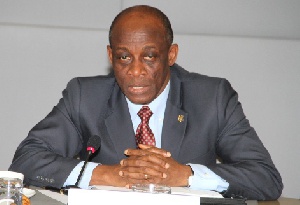 Mr Seth Terkper, Minister of Finance
Mr Seth Terkper, Minister of Finance
Government exceeded its borrowing target for the first six months of this year by more than GH¢763million, further deepening concerns about the country’s debt position.
Figures available to the B&FT from the central bank indicate that government borrowed a little above GH¢26.18billion in the first half of this year, which is more than the GH¢25.42billion it had planned to borrow from the domestic securities market.
The borrowings of government do not include the debts incurred by the Bank of Ghana and Cocobod, which together also borrowed GH¢3.9billion within the period.
The latest borrowing figures are likely to raise concerns about government’s efforts to reduce Ghana’s budget deficit, with increasing fears additional debt could sink the country into a deep debt trap that would increase cost of borrowing for the private sector.
Anxiety about the country’s debt levels more so have heightened at a time the nominal GDP growth has receded from 8.2% recorded for the last three months of 2014, to 6.5% for the first quarter of this year.
The biggest opposition party, NPP, last week hoisted a red flag about the ballooning public sector debts of the country, which as at May this year had hit GH¢89.5billion -- equivalent to 67.5 percent of GDP.
The minority spokesperson on Finance in Parliament, Dr. Anthony Akoto Osei, hit out at government for accumulating debts that could lead to debt overhang and plunge the country into a debt crisis similar to that of Greece -- a reference to the inability of Greece to meet its debt obligation to creditors.
However, the opposition’s assessment of the country’s debt situation has been rubbished by the ruling government, which has accused the minority of misleading Ghanaians over the country’s debts.
Meanwhile, the IMF -- which is now policing government’s fiscal programme -- has described Ghana as being in a high debt distress position.
B&FT analysis indicates that the borrowing numbers seem to be the result of very strong spending and weak receipts growth, which represents something more fundamental.
The excessive spending of government, rising interest cost, narrowed tax base of the economy coupled with macroeconomic challenges -- exacerbated by the three-year old power rationing programme -- has affected the tax revenue of government.
According to the provisional fiscal revenue data provided by the Finance Ministry, higher than expected public spending was one of the main factors behind the surge in borrowing.
The data issued by the Finance Ministry indicates that government’s revenue (including grants) for January to May summed up to GH¢12billion, which is less than the GH¢14.2billion it expended within the period.
Interest payments on its borrowings alone for the first five months of the year amounted to GH¢3.2billion, out of which GH¢2.5billion was paid on domestic debts.
Following the IMF’s approval of Ghana’s request for a US$918million Extended Credit facility, government is now pursuing a range of austerity measures to reduce the country’s public deficit.
These include retrenchment of public sector workers to reduce the wage bill, expanded tax regime, removal of subsidies on petroleum products, streamlining of tax exemptions for free zones firms and state-owned enterprises, freeze on public sector employment, clean up of the wage bill, among others.